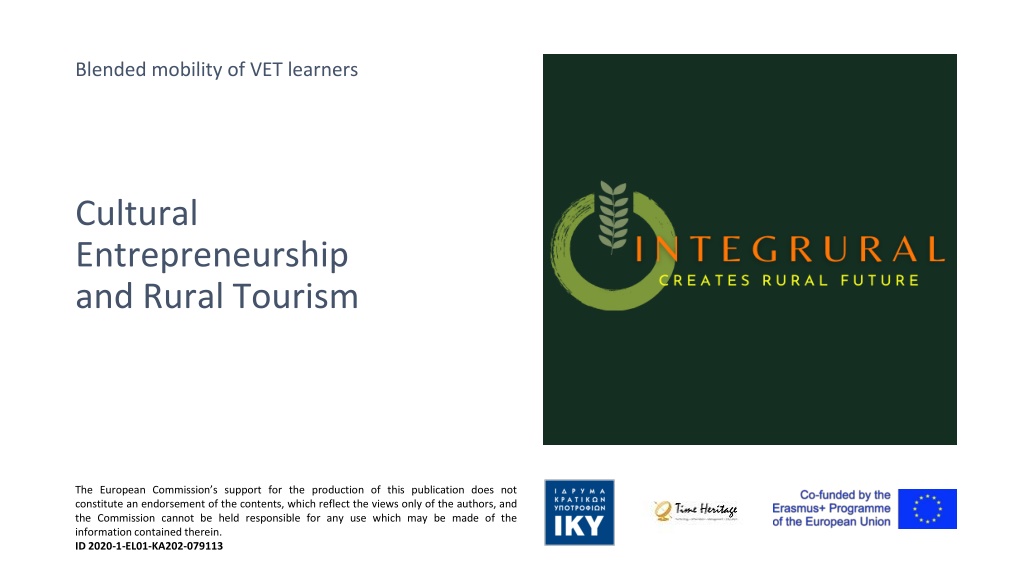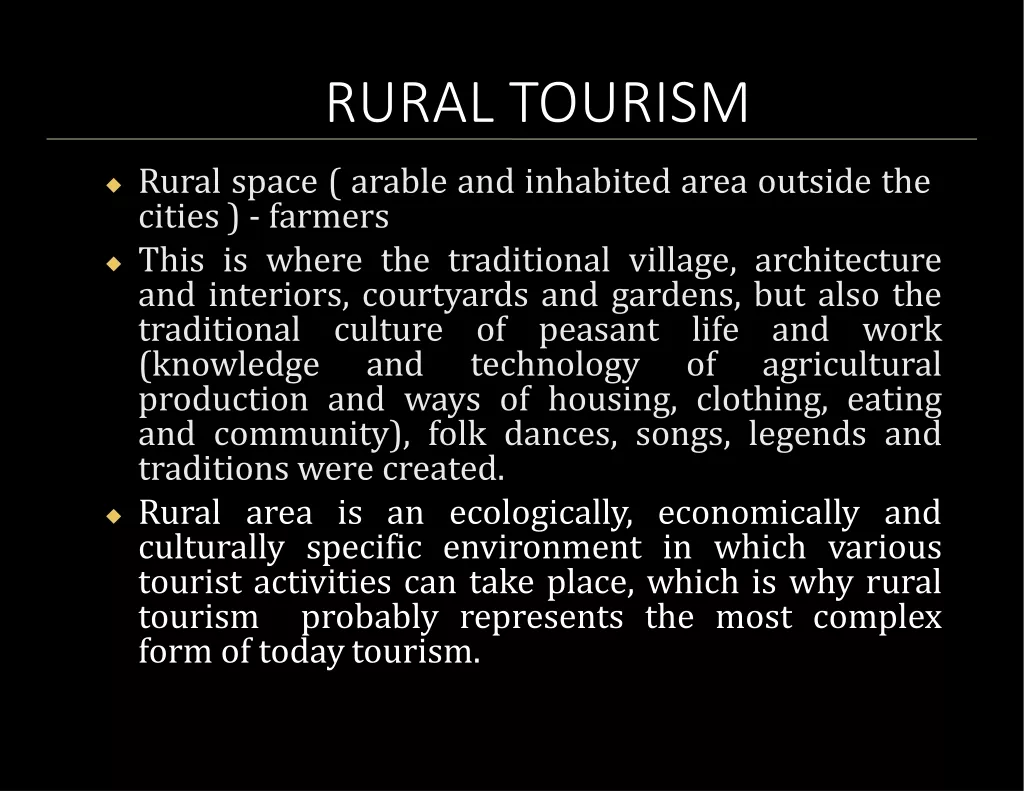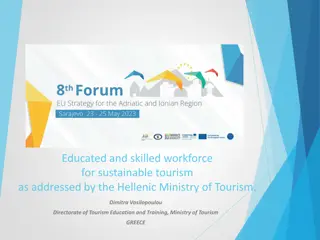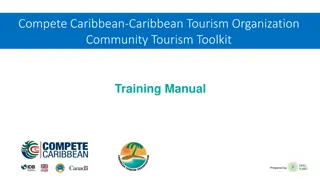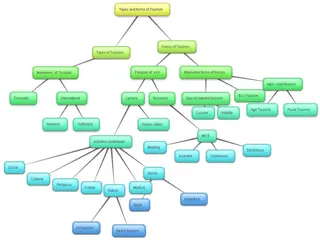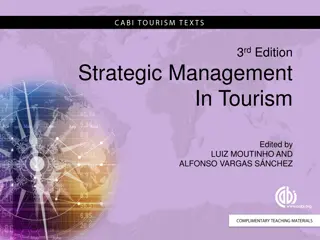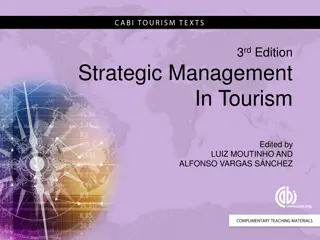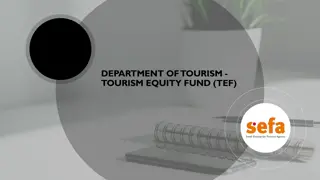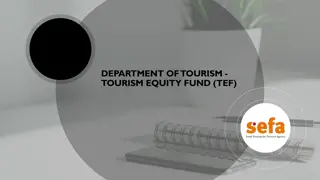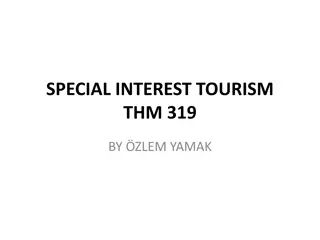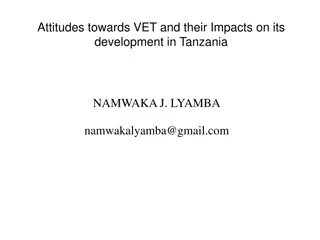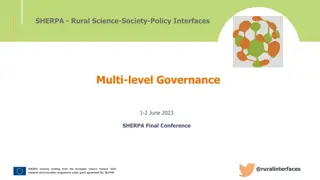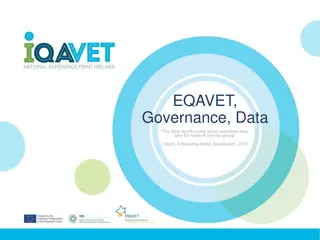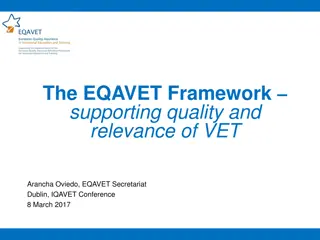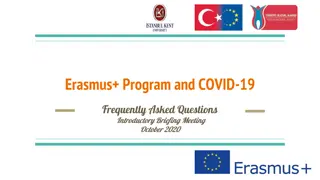Blended Mobility of VET Learners in Cultural Entrepreneurship and Rural Tourism
This publication emphasizes the importance of cultural heritage in rural tourism, showcasing examples like Agromenelais Farm. It discusses the integration of organic products, eco-friendly practices, and experiential offerings for successful business development in the tourism sector.
Uploaded on Sep 18, 2024 | 0 Views
Download Presentation

Please find below an Image/Link to download the presentation.
The content on the website is provided AS IS for your information and personal use only. It may not be sold, licensed, or shared on other websites without obtaining consent from the author. Download presentation by click this link. If you encounter any issues during the download, it is possible that the publisher has removed the file from their server.
E N D
Presentation Transcript
Blended mobility of VET learners Cultural Entrepreneurship and Rural Tourism The European Commission s support for the production of this publication does not constitute an endorsement of the contents, which reflect the views only of the authors, and the Commission cannot be held responsible for any use which may be made of the informationcontainedtherein. ID 2020-1-EL01-KA202-079113
Cultural heritage and tourism. 1 Rural tourism and agrotourism 2 Key points Case study: Agromenelais Farm 3 Rural Tourism and Rural Itineraries 4 Valorisation of Cultural Heritage for Rural Tourism 5 Arts, Crafts and Gastronomy 6
If all agree that cultural heritage (tangible, intangible and natural) is an anchor of the global tourism industry and a contributor of economic value to the local communities, the utilization of, for example, local aromatic plants and old recipes for the production of new organic products, the provision of experiential experiences in a farm, the transmission of experiences to the new generation are elements that help to maintain it, but also to the successful development of a business. 1. Cultural Heritage and tourism The same applies if the company respects the environment and bases its creation and operation on materials with an ecological label. Thus, a tourist unit that takes care to use ecological materials to build its accommodation, utilizes renewable energies, offers local products from small organic cottage industries, etc. is sure to have a positive response from its customers.
1. Rural tourism and Agrotourism: two terms with different definitions, which the one doesn t exclude the other. 2. Rural tourism enterprises do not necessarily occur on a farm or at an agricultural plant, they do not generate supplemental income for the agricultural enterprise. 2. Rural Tourism or Agrotourism? 3. Agrotourism: Is a subset of rural tourism and defines a commercial enterprise at a working farm, or agricultural plant conducted for the enjoyment of visitors that generates supplemental income for the owner. Agrotourism might include: outdoor recreation, educational experiences, entertainment (harvest festivals), hospitality services (farm stays, guided tours or outfitter services), on-farm direct sales
The farm (https://agromenelais.gr/ ) is based in the mountainous Karditsa village of Thrapsimi, at an altitude of 800 m. Since 2012, it has focused on the cultivation of organic superfoods, such as blueberries, aronia and goji berries. The younger generation was the one who, following the new nutritional trends, decided to develop products based on superfoods, cereals, vegetables and fruits grown with organic methods in their fields, in the same mountainous area. 3. Agromenelais Farm But they were not limited to these. Taking advantage of the nature around them, they standardize honey from beehives found in the fields themselves, pack oregano from the mountains of Agrafa, produce balsamic oil from the balsam grass, native to the inaccessible mountain slopes. They also created blends of teas and herbal infusions, while with the help of winemakers, they produce vermouths with various flavors, using old local recipes. Tip: I watch what's happening in the world, I dare, I make good use of the nature and the tradition!
In their leaflet they describe very clear the vision: 3. Agromenelais Farm: the Vision TIP: It is important to have a vision for what you want to achieve!
Agromenelais started as a family business, which later evolved into a cooperative with the input of other local farmers. Participants cultivate their own land and roles within the cooperative are distributed according to each individual's skills and knowledge. It combines experience with innovative ideas. The cooperative, like the original business, is self-financing. 3. Agromenelais: Inspiration and knowledge They diagnosed the new food trends in time and decided on their products based on this. But this was also combined with innovative initiatives, as one of the company's main shareholders confesses. Thus, the blueberry plants were supplied from the USA, and to choose which of the 10 varieties suits the microclimate and soil of the region, the supplier company from America used satellite data. "We marked the fields to the Americans and they did a satellite survey for weeks." While the aronia was procured from Poland, again based on the data of the region processed by the university. TIP: Cooperation with local actors, market analysis (what the customer wants), exploitation of experience, cooperation with scientific bodies inside and outside Greece
3. Agromenelais: Dissemination Comprehensive internet site with all information and products in 2 languages Leaflet in English Blog Social media: Facebook / Instagram / Twitter / Linkedin Locating and placing the products on the international market Correct and smart advertising Participation in agritourism exhibitions and festivals TIP: The use of the right marketing instruments and the good quality of the products are the condition of the sustainability
The cooperation itself is a kind of social interaction The offer of agritourism packages is another means of contact with society. So in 2019, and before the outbreak of the covid epidemic, for the first time: the 1st agritourism visit of 25 people from Finland, Italy, Austria, Portugal, Bulgaria and other European countries to the crops and facilities was successfully carried out of our company. [ ]. The visit ended with dinner at our company's restaurant, where our guests tasted local culinary delicacies and listened to Greek music." Such actions empower the local community and help the visibility of the business. At the same time, similar actions are offered for schools in the area. The students see that there are prospects in the primary sector and some of them will take advantage of it. In this way, not only the continuation of the production is ensured, but also the reduction of the abandonment of remote areas. In addition, they use their experience with consulting services regarding planting techniques, ways of yielding, but also methods of commercial exploitation 3. Agromenelais: Social Interaction TIP: It is important not to forget that the success of the project it presupposes in principle the acceptance of the local community
Participation in a tourism itinerary: the new trend of cultural and natural itineraries can be exploited. Local businesses and cultural associations can collaborate with scientific bodies and create routes that will highlight the local natural beauty combined with cultural elements, local products and gastronomy. Many cases can serve as an example to follow. 4. Rural Tourism and Rural Itineraries Menalon trail: https://menalontrail.eu/ in Greece. Every local museum, local historical place, local enterprise (cultivation, production and distribution of local product, local cuisine, etc.) can be part of the effort. Marchez sur les pas de Robert Louis Stevenson !: https://www.chemin-stevenson.org/ in France. Caminhadas TIME OFF: https://www.timeoff.pt/ in Portugal. TIME OFF started at the end of 2014, when Ana Pinto, the project leader, after 10 years of career, changed her life. In 2017, a blog was born to share stops in more rural Portugal. In 2018, a book joins the blog and in 2019 the Caminhadas TIME OFF are born. A family micro- business focused on nature tourism and rural tourism. The team works to provide the best experiences for participants. TIP: What is needed is the knowledge of the local peculiarities, collaboration with people who know the local history, the nature, the production, and the desire to highlight the location, in which case financial goals will be achieved for local businesses as well.
1. Utilization of buildings, such as: mills, industrial buildings, etc. and their configuration in places either for small hotels or for cultural activities. Important in this case is the use of environmental forms of reconstruction and use. 5. Valorisation of Cultural Heritage for Rural Tourism The Theonimfi Guesthouse (http://theonimfi.gr/en/index.html) : A manor house of 1850 which had been abandoned. It had to be built anew, with a marriage of the traditional with the modern element being the main idea. The stone and the wood, basic materials of the traditional Arcadian architecture are starring both outside and inside the guesthouse. In their internet site they propose many activities and sightseeings. Montanema Handmade Village (https://www.montanema.gr/en/about-us/ ) 2. The Pavliani Natural Park (https://www.allovergreece.com/Greek- Parks/Descr/4/en ) : The park extends to the headwater of the Asopos River on the lush green slopes of Mount Oeta. Following the main path, in addition to the impressive cascades and the shades and shadows of century-old trees reflected in the waters of the Asopos, visitors encounter small and big surprises that turn walking into a thrilling adventure and cause time to pass quickly in this pleasant and unique natural environment. All these surprises in Pavliani Park, which fully respect the unique natural environment and become one with it, are the result of the love and voluntary work of the village s residents. TIP: Look around in your village and find the building you think you can use. Discuss with the local administration the ways you can utilizes it, discuss your plan with specialized persons, find partners for your plan and then, you ask for financial support. Take advantage of the natural environment to increase the traffic of your area and consequently the profit of local businesses - this requires the passion and cooperation of all residents!
1. Organize handicraft workshops with local materials and traditional patterns Mosaic workshop in a little village, near Mistras: https://mosaicartgreece.com/pages/mosaic-art-workshops-greece 2. Organize local cooking and tasting classes for tourists "We started doing cooking classes at my house in Kaloxylos [in Naxos] with guests who wanted to learn about the Greek way of life and authentic cuisine , says a young woman, who originally has studied Classical Greek Literature. Now she runs her own enterprise! (https://vioma.gr/ ). 6. Arts, Crafts and Gastronomy 3. Build an eco farm Skiaxtro Eco Farm in West Messenia (https://skiaxtro.gr/en/ ) offers many activities for an alternative way of vacation (seminars, acts, retreats, alternative accommodation, cooking classes, art activities, farm work, animals, vegetable gardens, olive groves and many more).
